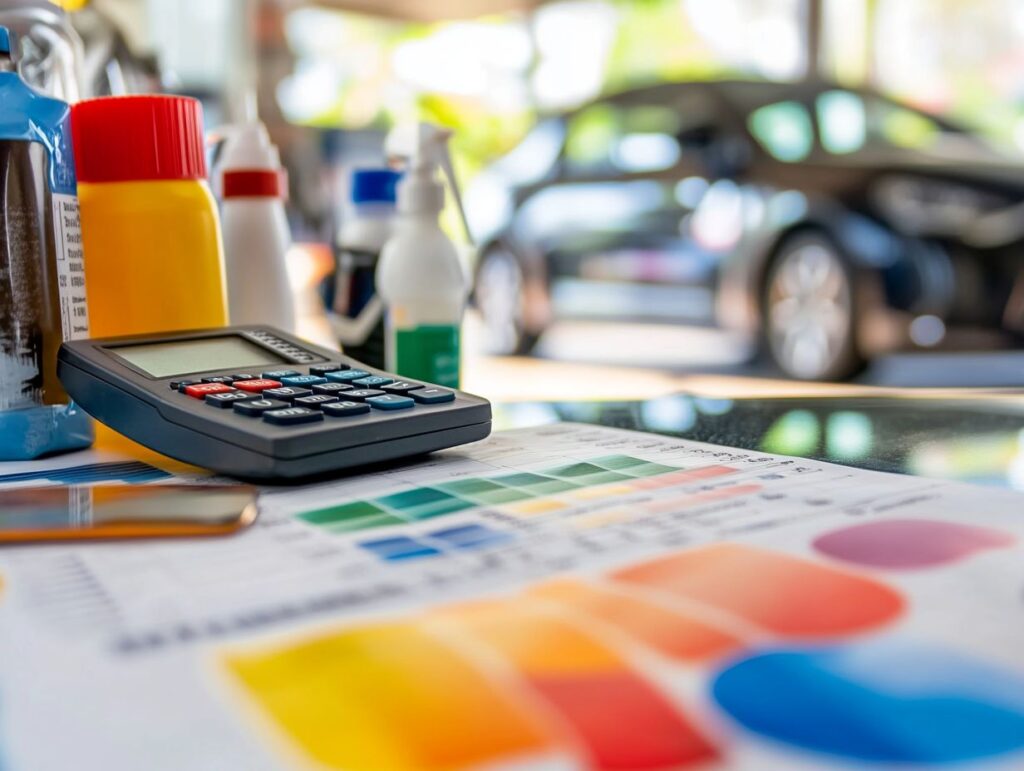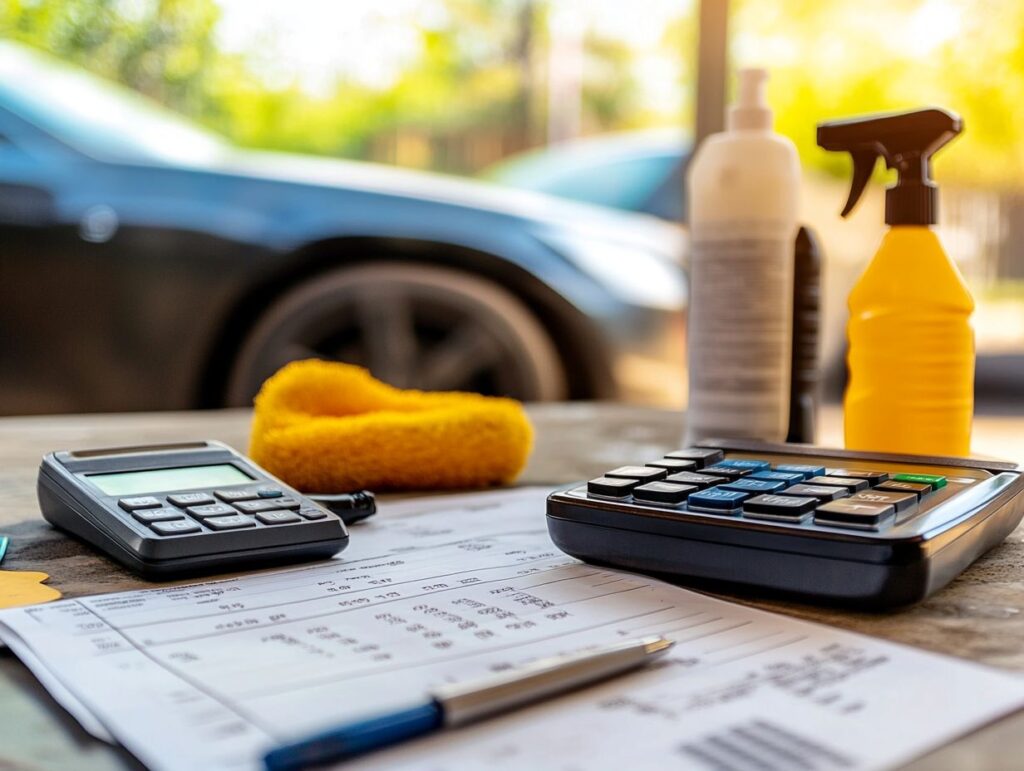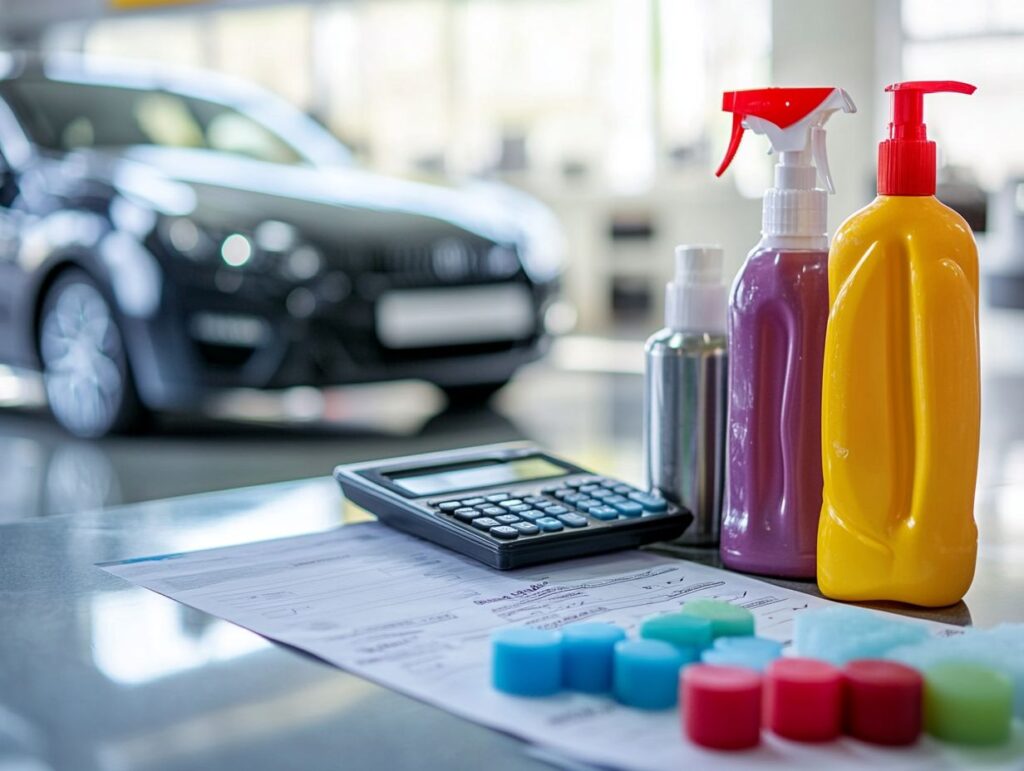
Starting an auto detailing business can be an exciting venture, but achieving success often depends on having a well-planned budget.
A startup budget is crucial for outlining initial costs, predicting potential income, and ensuring sufficient cash flow to maintain smooth operations.
This guide will break down the essential elements of creating an effective budget, covering necessary expenses such as equipment and insurance, as well as exploring funding options and strategies for staying on track.
Explore the insights provided here to learn how to set your business up for success!
Why You Need a Startup Budget for Your Auto Detailing Business

Creating a startup budget for your auto detailing business is essential for establishing financial goals and gaining a clear understanding of the risks involved in your venture. This budget serves as a foundational tool, helping you determine the revenue you need to achieve while outlining your expenses.
This, in turn, allows for a thorough risk assessment of your business operations. A well-detailed budget can also aid in conducting a competitive analysis, enabling you to identify market trends and positioning strategies that align with your profitability objectives.
With a thoughtfully structured budget, you can make informed decisions regarding resource allocation, ensuring that you have the necessary funds for essential tools and marketing initiatives that drive customer engagement. For example, by analyzing both fixed and variable costs, you can pinpoint unnecessary expenditures, which opens the door for strategic investments aimed at enhancing service quality.
Furthermore, a budget can illuminate potential financial pitfalls, allowing you to pivot or adapt your operations before issues escalate into more significant problems. Ultimately, having a comprehensive budget not only positions you to meet your financial goals but also significantly increases your chances of achieving long-term success in a competitive landscape.
Identifying Your Startup Costs
Identifying startup costs is a crucial step in establishing a successful auto detailing business, as it helps you grasp the initial investment required and plan your financial resources effectively.
This process involves a detailed breakdown of various expense categories. For instance, you’ll need to consider the costs of:
- Equipment for detailing products
- Marketing expenses such as website development and social media promotions
- Labor costs for hiring skilled employees
- Overhead costs like insurance and business licenses
By understanding these costs from the outset, you can make informed decisions that align with your budgeting strategies.
Equipment and Supplies
When embarking on the journey of starting an auto detailing business, it is crucial to grasp the significance of equipment costs. The right tools and detailing products play a vital role in determining the quality of services provided and, consequently, customer satisfaction.
From high-pressure washers to waxes and polishes, investing in quality equipment not only facilitates efficient vehicle maintenance but also impacts pricing strategies and profit margins. Establishing robust contracts with suppliers can greatly assist in managing inventory and minimizing costs associated with acquiring detailing supplies.
Some of the essential equipment includes:
- Steam cleaners
- Vacuum systems
- Buffers
While these items vary in price, they are all critical for achieving a professional finish. For example, a high-quality vacuum can cost anywhere from $100 to $500, and steam cleaners may range from $500 to $1,500. Investing in these tools yields superior cleaning results, enhancing the overall customer experience and increasing the likelihood of repeat business.
By sourcing detailing products such as specialty shampoos and ceramic coatings from reliable suppliers, businesses can ensure consistent quality while potentially benefiting from bulk pricing. This strategic approach not only elevates service quality but also fosters customer loyalty, ultimately contributing to the long-term success of the business.
Marketing and Advertising
Marketing and advertising play a vital role in the budget of any startup, particularly in the auto detailing business, as they are essential for building brand awareness and attracting customers. Allocating adequate funds toward marketing initiatives, such as social media campaigns, local advertising, and effective branding strategies, can significantly enhance visibility in a competitive market.
This investment not only aids in acquiring new customers but also helps foster long-term relationships through client retention programs.
When contemplating the most effective marketing strategies, it is important to assess how these methods can resonate with your target audience. Social media platforms can be used not only for promotions but also for engaging potential customers through tutorials and showcasing before-and-after examples of your detailing work.
Local advertising, such as distributing flyers and forming partnerships with nearby businesses, keeps your services top-of-mind within the community. Additionally, investing in a strong brand identity is crucial for establishing a reputable presence that builds trust and encourages referrals.
In an industry characterized by fierce competition, adopting a well-rounded marketing approach is instrumental in driving growth and achieving sustained success.
Insurance and Legal Fees
Insurance and legal fees play a critical role in your startup budget, as they provide essential protection for your auto detailing business against unforeseen liabilities and ensure compliance with legal obligations. By understanding the various insurance costs associated with detailing services, obtaining the necessary business licenses, and considering tax implications, you can effectively prevent financial setbacks.
Properly budgeting for these expenses is crucial for maintaining operational sustainability and mitigating risks.
Incorporating these costs into your financial planning is important not only for safeguarding your business assets but also for giving you peace of mind as you navigate the complexities of running a startup. By establishing a clear understanding of the types of insurance needed, such as general liability and workers’ compensation, business owners can strengthen their risk management strategies.
Moreover, adhering to legal requirements—such as local regulations and health standards—ensures that the business remains compliant and avoids potential fines. By factoring in these expenses, you may also benefit from advantageous tax deductions, ultimately improving cash flow while ensuring that you are adequately protected against potential claims that could jeopardize the viability of your venture.
Creating a Realistic Revenue Forecast

Developing a realistic revenue forecast is essential for your auto detailing business, as it allows you to establish achievable financial goals and assess the viability of your business model.
By analyzing historical sales data, understanding market trends, and considering customer demographics, you can create accurate revenue projections that align with your pricing strategy and profit margins.
This proactive approach enables you to adjust your operations in response to market demands, ultimately optimizing your overall business growth.
Estimating Income Potential
Estimating the income potential of your auto detailing business requires a thorough understanding of your target market and the identification of niche segments that align with your services. By analyzing customer demographics and current industry trends, you can project revenue streams based on service packages tailored to specific needs. This insight enables you to refine your marketing strategies and improve service quality, ultimately attracting a wider clientele.
To effectively identify and reach your ideal customers, it would be beneficial to conduct market research to uncover local demographics, such as age, income levels, and the types of vehicles commonly found in your area. Emphasizing premium services that cater to luxury vehicle owners or offering eco-friendly options for environmentally conscious consumers can help carve out specific niches in the market.
Additionally, leveraging social media and online platforms can significantly increase your visibility while facilitating engagement with potential clients who may have particular detailing needs. This approach not only enhances your reach but also optimizes your income potential through targeted service offerings.
Developing a Cash Flow Projection
Developing a cash flow projection is a crucial element of financial planning for your auto detailing business. It helps you anticipate both cash inflows and outflows.
By keeping an eye on operational expenses and maintaining sufficient cash reserves, you can ensure that your business operates smoothly and is prepared for unexpected financial challenges.
Additionally, utilizing budgeting tools can improve your cash flow management, allowing you to make informed decisions based on accurate financial data.
Managing Expenses and Cash Flow
Managing expenses and cash flow is essential for the sustainability of an auto detailing business. Effectively tracking expenses allows you to keep a close eye on operational costs.
By optimizing how resources are allocated and improving overall efficiency, you can minimize unnecessary expenses and enhance your profit margins. This proactive approach to cash flow management not only supports business growth but also prepares you for potential economic fluctuations.
To achieve these goals, implementing a reliable expense tracking system can offer invaluable insights. It enables you to identify spending patterns and pinpoint areas where savings can be made.
For instance, regularly reviewing vendor contracts and service agreements may lead to opportunities for renegotiation, resulting in more cost-effective arrangements.
Additionally, utilizing technology to automate parts of the expense tracking process can save valuable time, allowing business owners to concentrate on core functions.
By fostering a culture of fiscal responsibility among employees and encouraging them to take ownership of their departmental budgets, you enhance accountability while promoting a collaborative approach to financial management. This, in turn, sets the stage for long-term success.
Securing Funding for Your Auto Detailing Business
Securing funding for an auto detailing business is an essential step in transforming an entrepreneurial vision into reality. This funding provides the initial investment required to start operations and support growth.
It’s important to explore various funding sources, such as bank loans, investors, and grant opportunities, which can help raise the necessary capital.
Furthermore, participating in mentorship programs can offer valuable insights into the funding landscape and aid in building relationships with potential investors.
Options for Financing Your Startup Costs
When financing the startup costs for an auto detailing business, various options are available that can align with your financial strategy. From traditional bank loans to crowdfunding and personal savings, each financing route offers unique advantages as well as potential returns on investment.
It is important to evaluate these choices carefully while ensuring that you maintain sufficient cash reserves to handle any initial operational challenges.
Taking the time to assess each financing method thoroughly can significantly influence the viability of your venture. Traditional bank loans, for example, often come with lower interest rates, but they may require a solid credit history and collateral. Conversely, crowdfunding can create excitement and attract early customers, but it necessitates a compelling pitch and may involve fees. Personal savings, while advantageous due to zero interest, could risk depleting essential emergency funds.
By thoughtfully weighing these approaches and their financial implications, one can position their auto detailing startup for sustained growth and profitability.
Tips for Sticking to Your Budget

Adhering to your budget is a crucial practice for the success of your auto detailing business, as it ensures you stay accountable to your financial goals.
By utilizing effective budgeting tools and diligently tracking expenses, you can monitor your spending and pinpoint areas where adjustments in resource allocation may be necessary.
With disciplined financial practices, you can meet your targets and enhance the sustainability of your business.
Strategies for Managing Expenses and Staying on Track
Implementing effective strategies for managing expenses can significantly impact the financial health of your auto detailing business, helping you stay aligned with your budget. By establishing clear budgeting strategies and focusing on financial planning, you can identify areas where operational efficiency can be improved and costs can be reduced. This disciplined approach not only supports maintaining profitability but also prepares your business for future growth.
To fully leverage these strategies, you might consider adopting a zero-based budgeting method, which requires every expense to be justified, effectively eliminating unnecessary costs. Utilizing budgeting software to track spending in real-time can provide you with instant insights into your financial flows. Additionally, regularly reviewing your vendor contracts and negotiating better terms can further optimize your purchasing decisions.
Encouraging your team to suggest cost-saving measures can also promote a culture of accountability, ensuring that everyone is focused on the goal of managing expenses. By employing these techniques, you create a solid framework that keeps your business agile in a competitive marketplace.
Frequently Asked Questions
What is a startup budget for an auto detailing business?
A startup budget for an auto detailing business is a financial plan that outlines all the necessary expenses and investments required to establish and launch the business.
Why is it important to develop a startup budget for an auto detailing business?
Developing a startup budget for an auto detailing business is crucial because it helps you understand the financial requirements and potential costs associated with starting and running your business.
What are the key components of a startup budget for an auto detailing business?
The key components of a startup budget for an auto detailing business include initial capital investment, equipment and supplies costs, marketing and advertising expenses, employee salaries, and any additional costs such as permits and licenses.
How can I estimate initial capital investment for my auto detailing business?

To estimate your initial capital investment, you should research the costs of equipment, supplies, and other necessary items, as well as any initial fees or deposits required for leases or licenses. It’s also a good idea to add a buffer for unexpected expenses.
How can I keep my startup budget for an auto detailing business under control?
To keep your startup budget under control, you should prioritize your expenses and focus on essential items first. Consider purchasing used equipment or negotiating with suppliers for lower prices. It’s also important to track your expenses and make adjustments as needed.
Do I need to update my startup budget after launching my auto detailing business?
Yes, it’s essential to regularly review and update your budget as your business grows and evolves. This will help you stay on track and make necessary adjustments to achieve your financial goals.
The AutoPros.online team is dedicated to bringing you high quality automotive content for professionals and car enthusiasts, with topics like auto detailing, performance modifiations, repairs and automotive news.



